Partnerships and ecosystems:
Making entrepreneurship sustainable in the long term
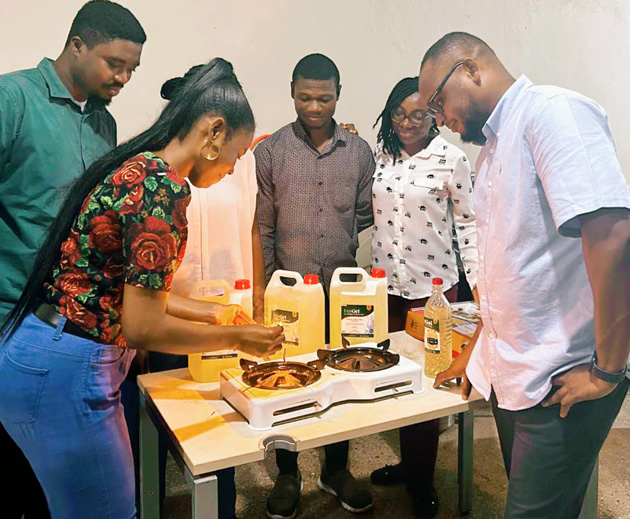
Dr. Nina Smidt, Managing Director, and Spokesperson of the Board at Siemens Stiftung visited Ghana in June 2023 and met entrepreneurs the foundation has been working with over the last few years. She wrote this article for the Founders Factory Africa.
“As a young woman in Ghana, it is extremely difficult to raise capital for your enterprise, people just don’t have the confidence in you, they want to see something very solid before they want to support you”, Patience Alifo, co-founder of ECONEXUS VENTURES LIMITED shares with me at her facility in the outskirts of Accra city. Founded in 2019 by two passionate sustainable energy entrepreneurs Patience Alifo and Prince Essel, the enterprise provides a cheaper and cleaner alternative to dangerous cooking fuels to low-income and middle-class households in Africa. Econexus has been selected by the European Union’s Horizon 2020 program funded Smart Energy Solutions for Africa (SESA) “SESA Call for Entrepreneurs 2022” for small and medium-sized enterprises (SMEs). Siemens Stiftung is one of the members of the SESA consortium that promotes access to sustainable energy solutions in Africa by working together with entrepreneurs like Patience in testing and validating their business models.
It was so fulfilling to see the 27-year-old founder proudly demonstrate how the pineapple skin is processed to create waste-to-energy bioethanol cooking gel that eliminates cooking and health hazards like pollution, and accidents caused by gas explosions. Raising the seed capital through personal savings and assistance from family, today the two founders have found a network of experts and fellow entrepreneurs at the SESA Incubator Program. In collaboration with SESA’s Ghanaian partner Akenten Appiah-Menka University of Skills Training and Entrepreneurial Development (AAMUSTED), ECONEXUS is testing the local manufacturing of newly designed industrial cookstoves that will be tested and validated at public schools in Accra and Kumasi.
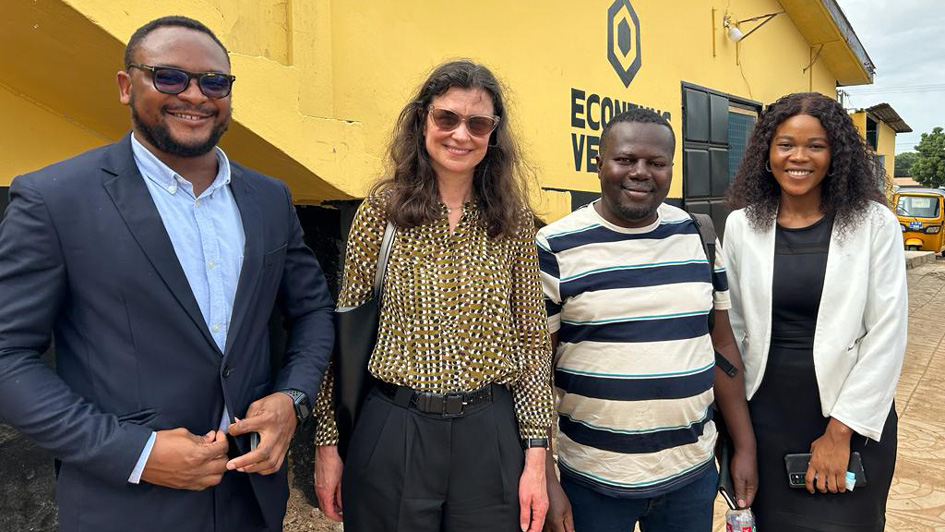
“Thanks to the SESA Incubator program, we understand our market better and plan our finances efficiently. The technical support from the European and African experts has been vital. We also have an experienced mentor, Dr. Edward Antwi, from the ethanol industry by our side. Apart from sharing his technical know-how, he is also coaching us on the operational level by helping us redesign our organizational structure and rope in more investors to grow our business. Also, working together with Elisabeth Biber and Romial Kenmogne from Siemens Stiftung has been invaluable”, adds Patience. Through its several local living labs, the SESA project facilitates the co-development of scalable and replicable energy access innovations that are being currently tested, validated, and later replicated across Africa.
The SESA project is one of our many engagements with social enterprises in Ghana. We started here a decade ago by assisting with the set-up of Impact Hub Accra (IHA), a locally rooted yet globally connected address for innovators – offering co-working, and conference room rentals, along with networking events, incubation, and acceleration programs. Such innovation hubs provide a tech ecosystem and a close-knit network of like-minded communities that enable startups to find a footing not only at the onset but at every stage of their business. We believe that entrepreneurs are the harbingers of change as their social innovations provide access to safe and sustainable cooking and drinking water, affordable healthcare, sustainable energy, and e-mobility solutions in remote regions in Africa. As an internationally operative non-profit foundation, our key themes include Access to Essential Services, Connected Societies, and Climate & Sustainability as they are fundamental to life and play a crucial role in driving sustainable development.
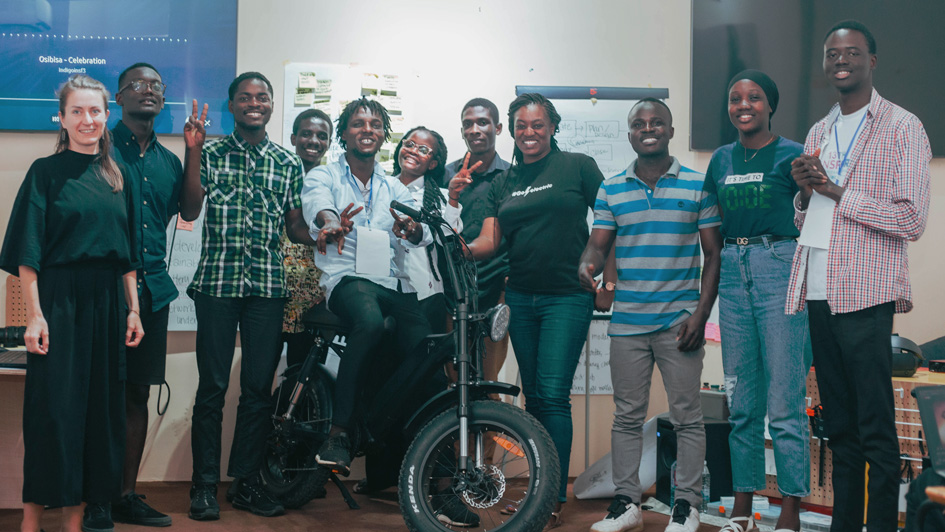
Social enterprises particularly anchor innovative solutions to the most pressing problems locally in underserved regions. Through collaborations with hubs like IHA and the SESA Incubator Program, entrepreneurs receive mentorship and hands-on knowledge to develop sustainable businesses and open economic prospects by creating local value chains. To take the example of e-mobility, my colleague Sebastian Gruss is working very closely with IHA on the project electric cargo bikes “Made in Ghana” to encourage sustainable production in the country to facilitate the decarbonization of Ghana’s transportation sector and meet its emission targets. The project is co-funded by the International Climate Initiative (IKI), an important part of the German government’s international climate finance commitment. Based primarily in Ghana’s capital, Accra, and its fourth-largest city, Tamale, 50 electric cargo bikes are being tested through a social entrepreneurship model. The project champions localization be it using circular economy principles in production and manufacturing along with unlocking economic potential for youth. Last year, we organized the first Design Sprint workshop – more than 30 final-year students from different Ghanaian universities and fresh graduates participated in developing prototypes for sustainable e-mobility charging facilities.
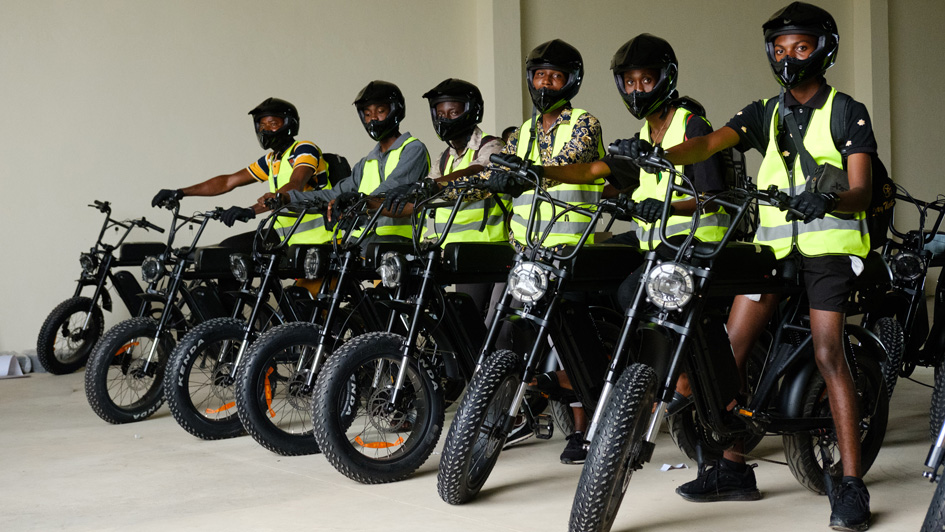
“Initiatives like Design Sprint engage young people to innovate solutions that will revolutionize the transport industry”, Will Senyo, the CEO of Impact Hub Accra explains. “The winners joined our team to develop their skills and capabilities. Our aim for the IKI Cargo Bikes project is to promote the use of e-cargo bikes in Africa as a viable means of transport. We are passionate about sustainable solutions, and continuously partner with local and international institutions like Siemens Stiftung to support inclusive growth in West Africa and beyond”, Will adds.
I also had a chance to meet the enthusiastic Design Sprint winners and ride with them the new e-bikes launched by wahu! Mobility, another local social enterprise we collaborated with. Apart from riding tips, the winners also shared with me how the program helped them secure jobs at the enterprise.
Over the years, we have been working with entrepreneurs in Ghana, Kenya, Uganda, South Africa, Nigeria, and Malawi. For us, innovation does not mean high-tech, or pioneering inventions that have not existed before. It rather reflects more on the processes through which entrepreneurs introduce new solutions with socio-economic consequences and challenge prevailing norms. For example, access to affordable and sustainable e-mobility and energy access for all. The cookstoves and the biofuel by Econexus might not be novel, yet their business approach to designing and locally manufacturing cookstoves for schools targets an unexplored market bringing direct impact to the community by addressing their need.
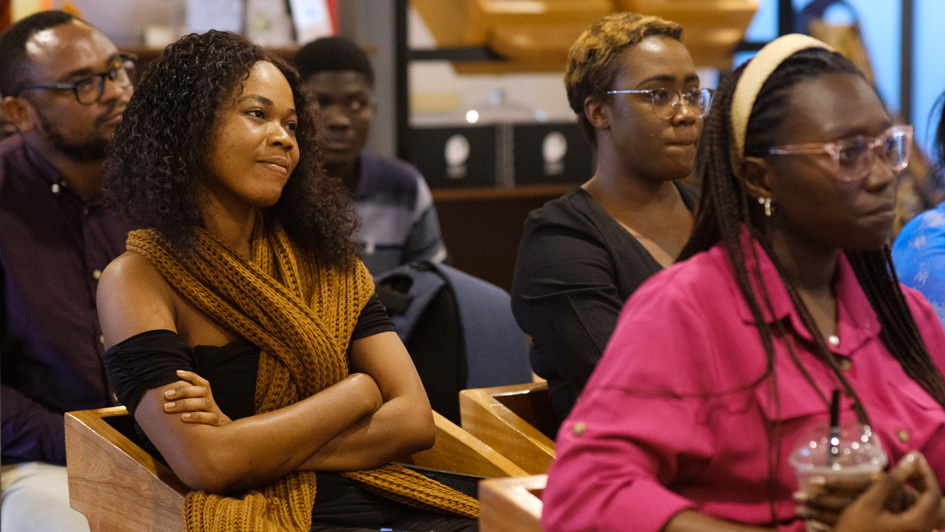
I believe that long-term impacts can be realized if innovations are embedded in local and national policies, business strategies and operations. Therefore, being part of ecosystems like IHA helps entrepreneurs further connect with peers, industry leaders and policymakers. By working together, a systemic change can be initiated on the ground.
Innovations look different in different markets and countries. For example, some African SMEs have leveraged the widespread use of mobile phones to develop innovative financial services around their products and easy mobile payment options and are way ahead of their German counterparts. Also, given the limited infrastructure facilities and the massive constraints on resources, it is refreshing to see the creative ways in which African entrepreneurs come up with out-of-the-box solutions to plug in the supply deficit by joining forces with their communities and creative thinking. I think, European entrepreneurs could also benefit from witnessing the ease with which African entrepreneurs form networks to overcome challenges collectively.
Also, it was heartening to see how social impact is prioritized alongside profitability. Often, the founders’ passion is ignited by a lived experience: Both Patience and Prince suffered family tragedies due to hazardous cooking practices that inspired them to develop a safe and sustainable cooking value chain for the entire community.
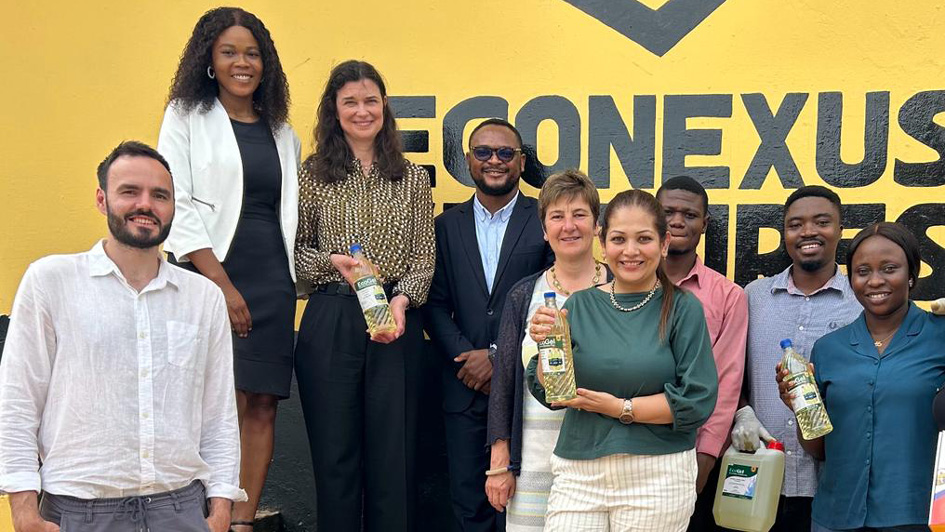
Contact
To learn more about our projects with social entrepreneurs in Africa, get in touch with:
Program Director E-Mobility
Marah Köberle
marah.koeberle@siemens-stiftung.org
Project Manager SESA
Elisabeth Biber
elisabeth.biber@siemens-stiftung.org
Photo 1: Patience Alifo and Prince Essel demonstrate the use of their sustainable cooking stove
© Econexus


